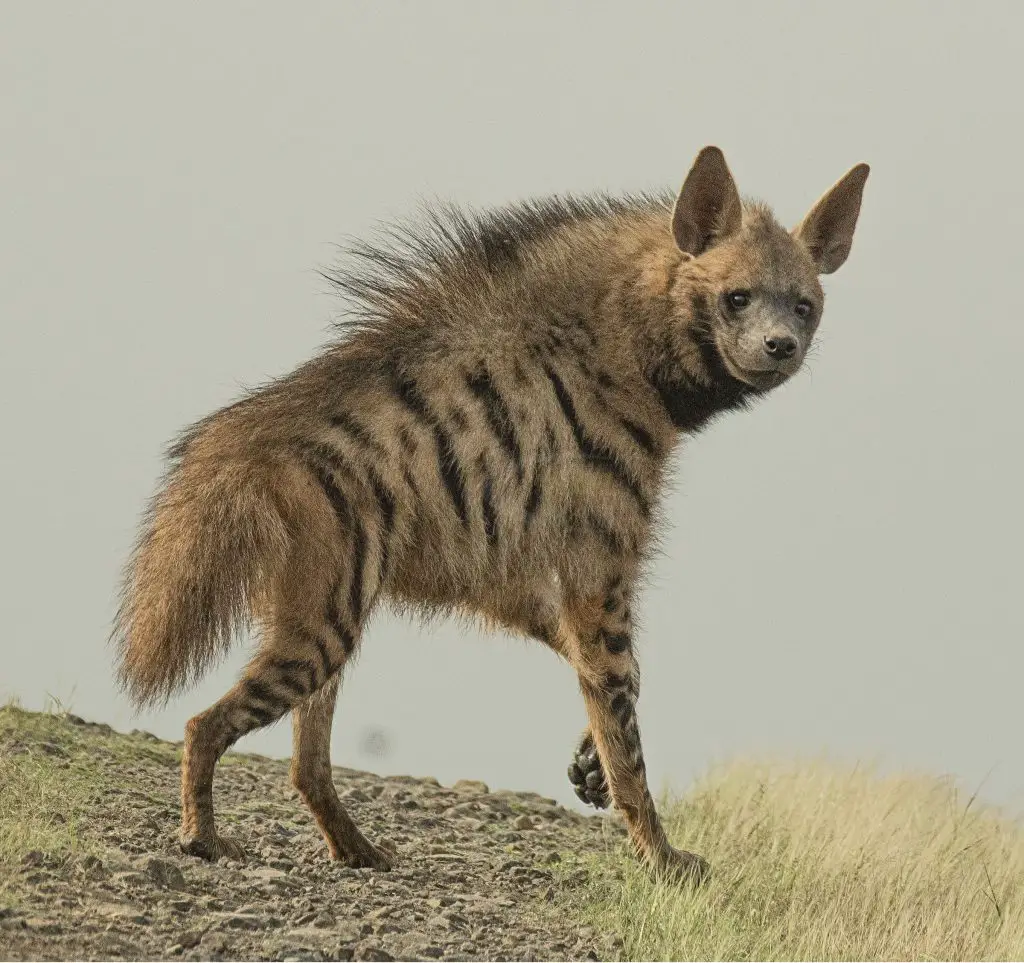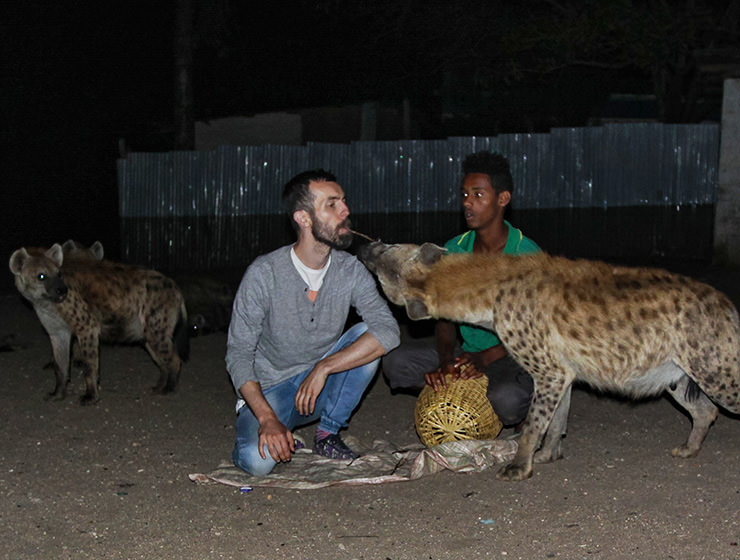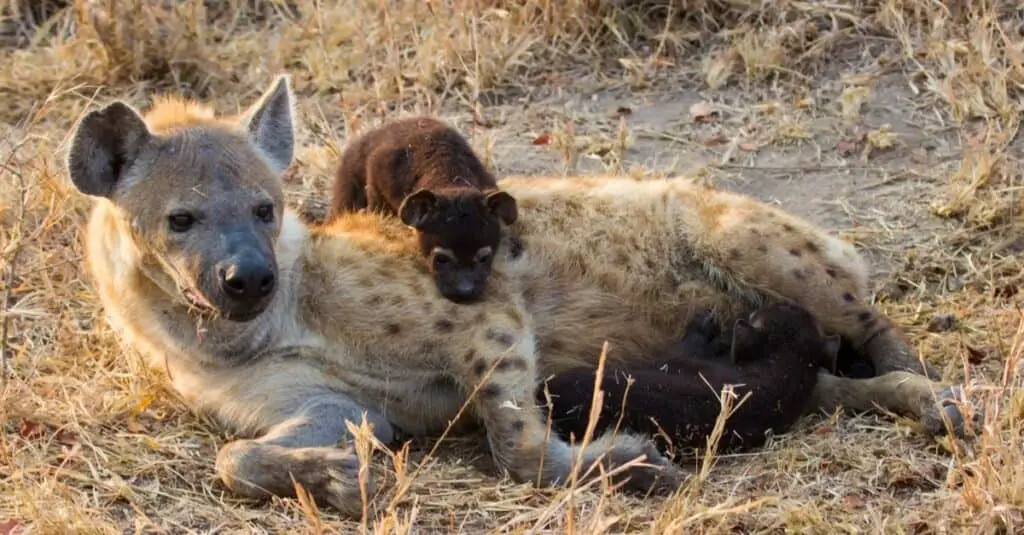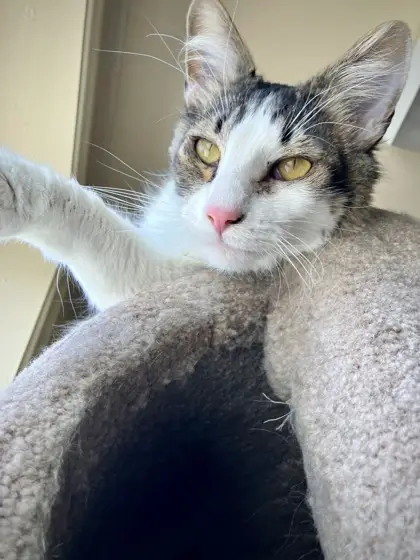Can Hyenas Be Pets?
No, hyenas cannot be kept as pets due to their wild and unpredictable nature. However, they are fascinating creatures with unique characteristics and behaviors that differentiate them from other carnivores.
Despite their reputation as scavengers, hyenas are skilled hunters and have a complex social structure within their clans. Known for their distinctive laughter-like vocalizations and powerful jaws, hyenas play a crucial role in maintaining ecosystem balance, especially in African savannas.
Understanding their biology, social dynamics, and ecological significance is essential for appreciating these misunderstood creatures. We will delve into the world of hyenas, uncovering interesting facts and dispelling common myths to enhance your knowledge about these charismatic animals.

Understanding The Nature Of Hyenas
Get to know hyenas and discover if they can be kept as pets. Uncover surprising facts about the nature of these fascinating creatures.
Hyenas are fascinating creatures that possess unique characteristics and behaviors. They are often misunderstood animals, surrounded by several misconceptions, particularly regarding their suitability as pets. In this section, we will delve into the distinctive traits of hyenas, explore the misconceptions surrounding them as potential pets, and understand the stark differences between their lives in the wild and in domestic environments.
Unique Characteristics And Behavior Of Hyenas:
- Hyenas are highly adaptable animals, found across various habitats in Africa, the Middle East, and parts of Asia.
- They are renowned for their exceptional hunting abilities and notorious scavenging habits, which have earned them the reputation of being ruthless and opportunistic predators.
- Hyenas belong to the family Hyaenidae and are divided into four species: The spotted hyena, brown hyena, striped hyena, and aardwolf.
- The spotted hyena, with its distinctive laughing call, is the largest and most well-known of the hyena species.
- Hyenas have a strong hierarchical structure within their social groups, known as clans, which are typically led by a dominant female called the matriarch.
- They are intelligent creatures, demonstrating problem-solving skills and complex communication through vocalizations, facial expressions, and body postures.
- Unlike other carnivores, hyenas possess exceptionally strong jaws and teeth, enabling them to crush bones and consume even the toughest parts of their prey.
The Misconceptions Surrounding Hyenas As Pets:
- Despite their intriguing nature, hyenas are not suitable as pets. There are several misconceptions that contribute to this notion:
- Hyenas are wild animals and retaining their natural instincts is crucial for their well-being, which can not be adequately fulfilled in a domestic setting.
- Their size, strength, and specialized dietary requirements pose significant challenges in terms of housing, feeding, and healthcare.
- Hyenas have specific social needs, living in tightly-knit clans with complex social dynamics. Isolating them from their natural social structure can lead to significant behavioral and psychological issues.
- Their hunting instincts and powerful jaws make hyenas potentially dangerous pets, posing a risk to owners and other pets in the household.
Hyenas In The Wild Vs. Domestic Environment:
- In the wild, hyenas play critical roles in maintaining ecosystems as apex predators and scavengers, contributing to ecological balance.
- Domestic environments lack the necessary space, resources, and social dynamics to replicate the natural conditions hyenas require for their physical and mental well-being.
- The specialized diet of hyenas, primarily consisting of meat and bone, is challenging to replicate and can lead to nutritional deficiencies in a domestic environment.
- The instinctual behaviors and hunting techniques hyenas employ to secure their prey are neither suitable nor safe within a domestic context.
As intriguing as hyenas may be, it is important to appreciate and respect their nature as wild animals. Understanding their unique characteristics, dispelling misconceptions about their suitability as pets, and recognizing the stark differences between their lives in the wild and in domestic environments allows us to ensure their well-being and conservation.

The Legal And Ethical Aspects Of Keeping Hyenas
Discover the legal and ethical considerations surrounding keeping hyenas as pets. Uncover the truth about owning hyenas and gain insights into the lesser-known aspects of these fascinating creatures.
Hyenas, with their distinctive laughs and powerful jaws, can be incredibly intriguing creatures. Many people wonder if they can be kept as pets. However, there are several important aspects to consider before bringing a hyena into your home. We will delve into the legal and ethical implications of keeping hyenas as pets, exploring regulations and laws, ethical considerations, and the role of responsible ownership.
Regulations And Laws Regarding Hyena Ownership
When it comes to owning a hyena, it’s essential to be aware of the regulations and laws that govern pet ownership. Here are some key points to consider:
- Permit requirements: Owning a hyena is not a simple endeavor. In most cases, a special permit is necessary from the authorities, such as wildlife agencies or local municipalities, to legally keep a hyena as a pet.
- Location restrictions: Additionally, the location where you reside may have specific restrictions. Some areas completely prohibit keeping hyenas as pets, while others have certain limitations, such as requiring owners to have a minimum amount of land or specific enclosures.
- Hyena species: Different species of hyenas may have different regulations. For example, spotted hyenas may have more stringent ownership requirements compared to other species.
- Specialized care: The authorities may also expect potential hyena owners to demonstrate a certain level of knowledge and preparedness in terms of providing specialized care for these wild animals.
Ethical Considerations And The Impact On Wild Populations
Apart from legality, ethical considerations surrounding hyena ownership are crucial. Here are some factors to bear in mind:
- Responsibility towards conservation: Hyenas are wild animals that play important roles in ecosystems. Keeping them as pets can potentially disrupt conservation efforts and contribute to the depletion of wild populations. Before considering ownership, it’s essential to prioritize their well-being in their natural habitats.
- Animal welfare concerns: Hyenas have complex social structures and specific needs. Captivity may cause physical or psychological harm to them due to the inability to fulfill their natural behaviors and habitats.
- Impact on public perception: Owning a hyena as a pet can influence public perception and attitudes towards these animals. It is crucial to consider the broader impact and potential harm to the reputation of hyenas and their conservation status.
The Role Of Responsible Ownership
While the idea of owning a hyena may seem enticing to some, responsible ownership is of utmost importance. Here’s what it entails:
- Expert guidance: If you are truly dedicated to owning a hyena and have the necessary permits, it is crucial to seek guidance from experts in hyena care, including veterinarians and experienced owners, to ensure the well-being of the animal.
- Proper facilities: Hyenas require spacious enclosures that mimic their natural habitats, with enrichment and opportunities for social interaction. Providing a suitable environment is vital for their physical and mental well-being.
- Education and awareness: Responsible owners should actively educate themselves and others about hyenas and their conservation status. Raising awareness can help dispel misconceptions and contribute to efforts to protect these remarkable creatures.
Owning a hyena as a pet is a complex matter with legal, ethical, and conservation implications. Before embarking on such a journey, individuals must fully understand and comply with the legal requirements, comprehend the ethical considerations, and commit to responsible ownership.
A thorough evaluation of these aspects ensures the well-being of hyenas and supports their preservation in the wild.
The Challenges Of Owning A Hyena
Owning a hyena as a pet poses numerous challenges due to their wild nature and unique requirements. Discover the surprising truths about hyenas and why they are not suitable as household pets.
Hyenas are fascinating creatures with unique characteristics and behaviors that make them a challenging choice for a pet. Before considering bringing a hyena into your life, it’s crucial to understand the various challenges that come with owning one. From their space and enclosure requirements to their dietary needs and training challenges, let’s dive into what it takes to care for a hyena.
Space And Enclosure Requirements For Hyenas:
- Hyenas require a large and secure space due to their natural wandering nature.
- An enclosure should have a minimum size of one acre, with high walls to prevent escape.
- It’s crucial to provide ample space for them to run and explore, mimicking their natural habitat.
- Including various elements like trees, rocks, and hiding spots in the enclosure can enrich their environment and provide mental stimulation.
- Regular inspections should be conducted to ensure the enclosure remains intact and secure.
Dietary Needs And Feeding Habits Of Hyenas:
- Hyenas are carnivores with a sophisticated diet, primarily consisting of meat.
- Their diet should resemble that of their wild counterparts, including lean meats like beef, chicken, and fish.
- Large bones are essential for dental health and exercise, and they should be provided regularly.
- Consult with a veterinarian or a specialized exotic animal nutritionist to ensure a well-balanced diet.
- Regular feeding schedules should be maintained, avoiding excessive feeding that may lead to weight gain or other health issues.
Socialization And Training Challenges:
- Hyenas are wild animals by nature and have inherent behaviors that can make socialization and training challenging.
- Early socialization is vital to tame their aggressive tendencies, but it requires a skilled and experienced handler.
- Their sharp teeth and strong jaws present safety concerns during training, requiring caution and expertise.
- Patience and consistency are key when training hyenas, as they have a naturally independent and stubborn disposition.
- Building trust through positive reinforcement techniques is essential for successful training.
Owning a hyena comes with various challenges, including meeting their space and enclosure requirements, providing a suitable diet, and tackling the socialization and training difficulties that arise. Before considering a hyena as a pet, it’s crucial to fully understand and prepare for the unique demands they bring.
If you’re up for the challenge and have the proper knowledge and resources, the experience of owning a hyena can be rewarding and fulfilling.
The Potential Risks Associated With Hyena Ownership
Discover the hidden dangers involved in owning a hyena as a pet. Gain valuable insights into the challenges and risks that come with hyena ownership. Explore the facts you never knew about hyenas as potential pets.
Hyenas may seem intriguing as pets, but it’s essential to be aware of the potential risks associated with owning them. Let’s explore the various aspects you should consider before taking on the responsibility of a hyena companion.
Zoonotic Diseases And Health Risks:
- Hyenas can carry zoonotic diseases, including rabies, tuberculosis, and brucellosis, that can be transmitted to humans. It’s crucial to understand the health risks and take necessary precautions.
- The presence of these diseases not only affects the health of the owner but can also be detrimental to the hyena’s well-being. Regular veterinary check-ups and vaccinations are necessary to minimize these risks.
Physical Safety Concerns:
- Hyenas possess sharp teeth and strong jaws that can cause severe injury. Even unintentional bites or scratches can lead to infections and complications.
- Their unpredictable nature, especially during feeding time or when threatened, increases the risk of accidents or aggressive behavior. Proper training, socialization, and secure enclosures are vital for minimizing hazards.
Financial Costs And Responsibilities:
- Owning a hyena comes with significant financial burdens. Expenses include enclosure construction, specialized veterinary care, high-quality diet, and enrichment activities to ensure the hyena’s physical and mental well-being.
- Depending on the local regulations, obtaining permits and licenses for hyena ownership can also incur additional costs and legal requirements that must be adhered to.
Considering the potential risks associated with hyena ownership, it’s crucial to thoroughly evaluate your readiness and capabilities before pursuing this unconventional pet choice. Ensuring the health and safety of both yourself and the hyena should always be the top priority.
Alternatives To Keeping A Hyena As A Pet
Curious about having a hyena as a pet? Discover the truth about keeping hyenas as pets and explore the alternative options available.
Have you ever found yourself intrigued by the idea of owning an unusual pet? While the thought of having a hyena might cross your mind, there are alternative options that are much more suitable. In this section, we will explore some exotic pets that can fulfill your desire for an extraordinary pet, as well as the importance of animal sanctuaries and conservation efforts.
Respecting the natural habitat of hyenas is crucial, and understanding these alternatives will help you make an informed decision.
Exotic Pets That Can Fulfill The Desire For An Unusual Pet:
- Fennec Fox: Known for their adorable appearance with large ears, these small-sized foxes can be kept as pets. They are highly active and require plenty of space to roam.
- Sugar Glider: These tiny marsupials are social animals and form strong bonds with their owners. They have a curious nature and can glide through the air using their skin flaps.
- Capybara: As the largest rodent in the world, capybaras are friendly and social creatures. They enjoy being around humans and can even learn to recognize their names.
Animal Sanctuaries And Conservation Efforts:
- Supporting Animal Sanctuaries: Instead of keeping a hyena as a pet, consider visiting or supporting local animal sanctuaries. These organizations provide a safe environment for rescued animals and work towards their conservation and rehabilitation.
- Wildlife Conservation: By contributing to wildlife conservation efforts, you can help protect the natural habitat of animals such as hyenas. Supporting organizations that focus on preserving ecosystems and educating the public about these creatures is a meaningful way to make a difference.
Remember, while it may be tempting to keep a hyena as a pet, it is essential to understand and respect their natural habitat. Exploring alternative pets and getting involved in animal welfare initiatives can be equally rewarding. By raising awareness and supporting conservation efforts, we can ensure a brighter future for not only hyenas but also for all wildlife.
Frequently Asked Questions For Can Hyenas Be Pets? Everything You Didn’T Know About Hyenas
Has Anyone Ever Had A Hyena As A Pet?
Yes, some people have kept hyenas as pets, although it is not recommended due to safety concerns.
Can A Hyena Be Domesticated?
No, hyenas cannot be domesticated due to their wild nature and unpredictable behavior.
Do Hyenas Get Along With Humans?
Hyenas do not typically get along with humans due to their wild nature and potential danger.
What To Do If A Hyena Sees You?
If a hyena sees you, calmly back away without making sudden movements or eye contact.
Conclusion
It is clear that hyenas should not be considered as pets due to their complex needs and unpredictable behavior. While they may appear fascinating from a distance, their innate instincts, social structure, and dietary requirements make them unsuitable for domestication.
Hyenas are highly specialized predators with a strong affinity for scavenging, which poses potential risks to humans and other animals. Additionally, their strict social hierarchy and specific environmental needs make it challenging to provide them with a suitable living environment.
It is crucial to prioritize the well-being and conservation of these magnificent creatures in their natural habitats, where they can thrive and play their vital role in ecosystem balance. Instead of owning a hyena as a pet, individuals can support initiatives that focus on their welfare, education, and conservation efforts.
Ultimately, by respecting the natural order and diversity of animal species, we can foster a healthier planet for both humans and wildlife alike.







